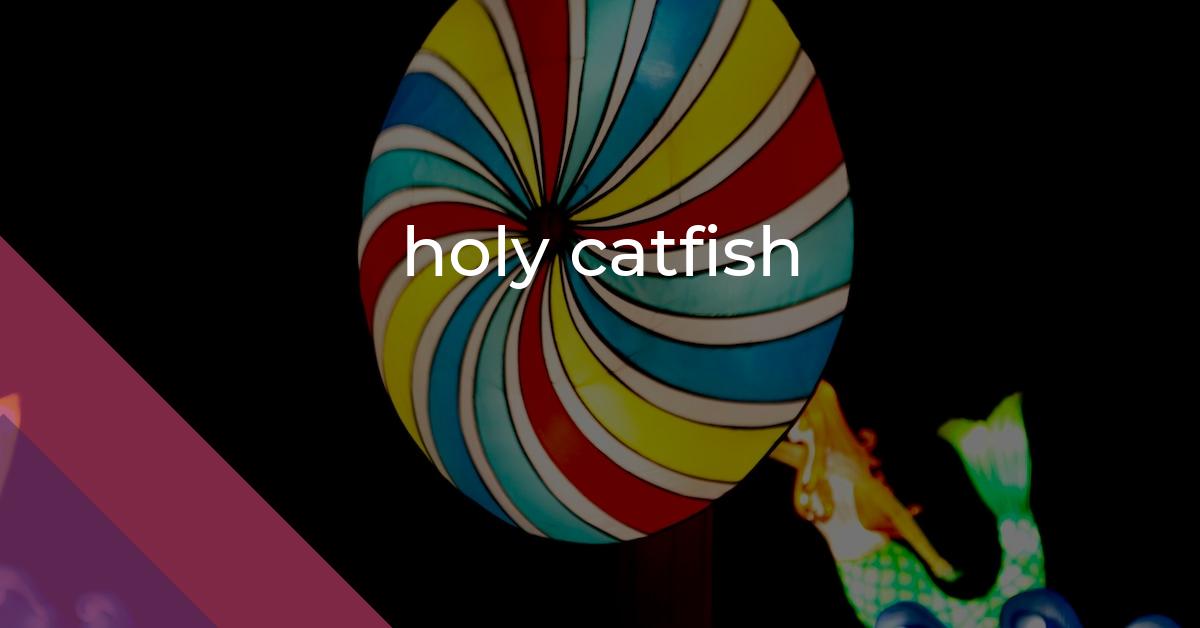holy catfish: Idiom Meaning and Origin
What does ‘holy catfish’ mean?
The idiom "holy catfish" is an exclamation used to express surprise, astonishment, or disbelief. It is a lighthearted and humorous way to convey one's reaction to a surprising or unexpected event or situation.

Idiom Explorer
The idiom "Jesus, Mary, and Joseph" is an exclamation of shock, surprise, or frustration. It is used to emphasize strong emotions or disbelief.
The idiom "I'll be damned" is used to express shock, disbelief or surprise when something unexpected or unbelievable happens.
The idiom "holy smoke" is an exclamation used to show surprise or astonishment. It is often used in a humorous or lighthearted way to express disbelief or amazement at something unexpected.
The idiom "holy moley" is an exclamation of surprise or astonishment. It is used to express shock or disbelief in a lighthearted or playful manner.
The idiom "holy mackerel" is an exclamation typically used to express surprise, astonishment, or disbelief. It is often used to emphasize the intensity of one's reaction to a situation or information.
The idiom "holy macaroni" is an exclamation of surprise or amazement.
The idiom "holy fuck" is an exclamation used to express extreme shock, surprise, or disbelief. It is a vulgar phrase meant to emphasize the intensity of the reaction.
Unveiling the Enigma
Holy catfish is an idiom used in American English to express surprise or astonishment. Its exact origin and meaning are uncertain, but there are a few theories that have been suggested by linguists and researchers.
One theory suggests that "holy catfish" may have originated from the expression "holy mackerel." Both "catfish" and "mackerel" are types of fish, and it is possible that "holy catfish" was created as a playful variation of the more common expression "holy mackerel." This theory is supported by the fact that both phrases are used to express surprise or astonishment.
Another theory proposes that "holy catfish" is a blend of two other idioms: "holy cow" and "every dog has its day." In this case, "catfish" would be a replacement for "cow," and the overall meaning would convey surprise or astonishment at an unexpected turn of events. Idioms often evolve and change over time, with new variations being created through the blending of existing expressions.
Despite these theories, the precise origin and meaning of "holy catfish" remain uncertain. It is possible that the phrase emerged organically through everyday language use, without any specific historical or cultural reference. Alternatively, it may have originated in a specific region or community, with its exact meaning and usage reflecting the unique characteristics of that group.
Similar to "holy catfish," the idiom "holy cow" is also used to express surprise or astonishment. It is believed to have originated in the early 20th century as a lighthearted and euphemistic way to avoid using religious exclamations. The word "cow" was likely chosen for its humorous and unexpected nature, adding to the overall impact of the expression.
Another related idiom is "holy crap," which is a more informal and slightly stronger way to express surprise or astonishment. The word "crap" is considered to be a milder alternative to more explicit language and is commonly used in informal and colloquial contexts. Similar to "holy catfish" and "holy cow," "holy crap" is a playful expression that adds emphasis to the speaker's reaction.
The idiom "holy catfish" is used in American English to express surprise or astonishment. While there are several theories about its origin and meaning, none can be confirmed with certainty. The phrase may have emerged as a variation of "holy mackerel" or as a blend of other idioms. Its exact origin and meaning, however, remain elusive. The study of idioms and their etymology is a fascinating yet complex field, full of potential discoveries and interpretations. Holy catfish is just one example of the many linguistic treasures that await exploration.
Example usage
Examples of how the idiom "holy catfish" can be used in a sentence:
- When she won the lottery, she exclaimed, "Holy catfish, I can't believe it!"
- As the roller coaster plummeted down the steep drop, I couldn't help but scream, "Holy catfish, this is intense!"
- After seeing the amazing magic trick, the audience shouted, "Holy catfish, how did he do that?!"
More "Animals" idioms



